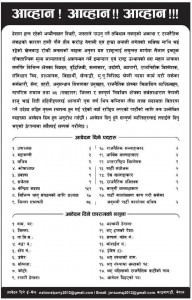Political Vacancy
In eastern Himalayas, two countries are in transition – Bhutan from absolute monarchy to constitutional monarchy and Nepal from constitutional monarchy to republic. Transitions are always painful – smaller voices make all their efforts to get heard. In transition, nothing is illogical.

In Nepal, over a hundred political parties are registered. Choices are many yet decisions are left to the few. In Bhutan, there are only two choices (political parties) and most decisions come from two (individuals). Creating an environment for wider public participation is a herculean task. We might argue decisions by a few individuals is not a democracy but get example from US where president exercises most executive powers and India where greater public participation has shattered the dreams of peaceful and prosperous democracy.
I smell Bhutan and Nepal are making, inch by inch, microscopic efforts for wider public participation in democratic exercise. Bhutan’s emerging political group Druk Chirwang Tshogpa has used the social network like Facebook to advertise vacancy to run the upcoming elections. In Nepal, a nameless party has advertised in a national daily to fill all its positions, except president.
Both these group remain Faceless and story-less. As a political group, they have not informed the public about their ideology, mission and philosophy. The groups have not come up through larger public consultation. Essentially, for a political party to grow stronger, it has to create a voter’s bank – the life of political party. Creating voters’ bank is possible only by culmination of like-minded people reaching out to wider public seeking their guidance, listening their grievances, needs, demands and expectations. Despite being a democratically better approach to build a party, these two groups have largely defaulted on choosing a comprehensive and apposite modus operandi.
Political transitions are sensitive in the sense that it will either push the country into worst or best. Making suitable choices always remain historic. But an imposed historic decision makes no sense. Widely accepted decisions leave golden impressions.
Making political choices and making them work is drudgery for new aspirants. And in transition, political courses are not always determined by what one believes in terms of ideology and philosophy. Aspirations and enthusiasm indoctrinate the budding political players of what their course would be in future.

This is eastern (at least South Asian) social character. We don’t follow what we believe in, we believe in what we follow. And we follow what my neighbours follow, my relatives follow and what my village headman told me to follow. This is because we have less time to read, analyse and identify what best suits me. Others have to tell me what I should be. That’s why parents decide what their children should be – doctors, engineers and pilots, parents decide whom their son or daughter will marry with. And a local priest/preacher decides what religion should I follow.
Let me get back to politics. A fundamental part of the social phenomenon, politics can never get out of the border of the basic social character I mentioned above. And as appreciator of the top-down approach, South Asians prefer let others set the course so they join it.
These two parties are calling on people to join them in darkness. As aspiring political groups, it is important for them to let the people make informed choices. And more important, telling people who they are, what they are for and why they stand here makes it easy to get candidates. It is uncertain that one’s contribution to society only by being an MP or a party’s vice president. Like-minded people have to come together, all have to understand the strategies, procedures and policies of the group and work in team spirit. Vacancy announcement does not create such environment.